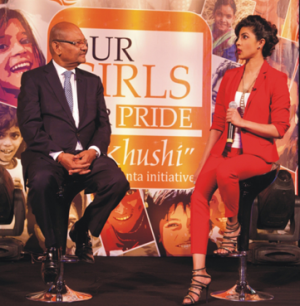
2nd September 2013. On the same day that the last of twelve villages voted Vedanta out of Niyamgiri for good, Vedanta announced a new major Corporate Social Responsibility and PR campaign to save its tattered reputation. The campaign, in partnership with the Vedanta funded station NDTV, entitled ‘Our Girls, Our Pride‘, will focus on nutrition, education, health, foeticide and infanticide affecting girl children in India. Miss World 2000, Bollywood superstar and UNICEF’s Goodwill Ambassador for child rights – Priyanka Chopra, will be the face of the campaign. The idea that Vedanta could be an ambassador for the well being of India’s poorest girl children is beyond farcical. Vedanta’s mining and processing operations have displaced, poisoned and polluted thousands of families. Their low pay, anti-union activities and worker’s deaths have deprived hundreds of young girls of their parents and plunged their families into poverty.
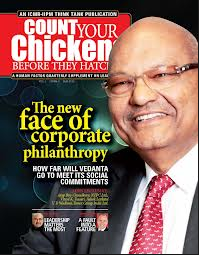 Vedanta used the launch of the Our Girls Our Pride programme to promote another PR campaign which they have run since 2008 to make India ‘a child malnourished free nation’. To achieve this goal they promote their take-over of 14,000 Anganwadi (child day care) centres – as part of a mass privatisation programme. This privatisation has been opposed by Anganwadi workers who claim centres are being shut down and jobs lost as a result. Karnataka Anganwadi teachers held a protest in August which demanded an end to Vedanta’s privatisation or a state wide strike would be held.
Vedanta used the launch of the Our Girls Our Pride programme to promote another PR campaign which they have run since 2008 to make India ‘a child malnourished free nation’. To achieve this goal they promote their take-over of 14,000 Anganwadi (child day care) centres – as part of a mass privatisation programme. This privatisation has been opposed by Anganwadi workers who claim centres are being shut down and jobs lost as a result. Karnataka Anganwadi teachers held a protest in August which demanded an end to Vedanta’s privatisation or a state wide strike would be held.
Vedanta also emphasised their widespread promotion of Self Help Groups which they claim have ‘transformed 14,900 women into Rural Entrepreneurs’, plus health camps, a Heart Hospital in Rajasthan and a 350 bed Cancer Hospital in Raipur. These health centres will be necessary for those living near or working in Vedanta’s plants which have repeatedly polluted and poisoned their locality. Just this year Vedanta’s Sterlite copper smelting subsidiary in Tamil Nadu released toxic gases (thought to be largely sulphur dioxide) which choked thousands of local inhabitants leading to ongoing health impacts and one death. Self Help Groups on the other hand have been effective in reducing mass dissent against Vedanta’s operations, as women receiving money as part of the scheme sometimes feel unable to criticise the company despite the obvious health impacts on their children and themselves. Not in every case however, as even Vedanta’s CSR darling village of Phuldumer on the Niyamgiri mountain adamantly opposed their proposed mine despite the Self Help Groups they had set up there. This article looks at a few specific cases in which young girls have suffered as a result of Vedanta’s activities and aims to demonstrate the total incompatibility of Vedanta’s style of operation with the well being of communities and their girls.
Foil Vedanta is coordinating a mass letter to Priyanka Chopra signed by women’s orgamisations urging her to pull out of the campaign and avoid helping to clean Vedanta’s rightly sullied reputation.
Please sign a public petition asking NDTV to pull out their support for the campaign here, and a petition asking Priyanka Chopra to pull out here, or contact us on foilvedanta@riseup.net if your organisation wishes to be a signatory to the letter (which can be found at the end of this post).
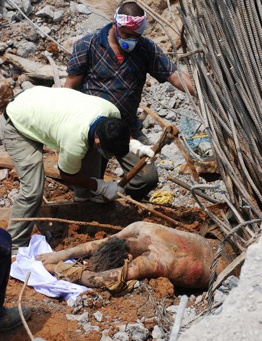 In September 2009 up to 100 workers were killed at Vedanta subsidiary BALCO’s Korba factory in Chhattisgarh (where Vedanta’s new cancer hospital is being built) when a chimney they were building with a cheap Chinese contractor collapsed on them. Vedanta claim only 42 were killed, but more than 60 remain missing. Krishnendu Mukherjee has reported that many left behind them young families, girl children whose mothers never even saw their husband’s bodies, let alone received any compensation. Though the salary these men received was meagre, without it their families have been cast into an even deeper poverty, and the women have been left to pick up the pieces.
In September 2009 up to 100 workers were killed at Vedanta subsidiary BALCO’s Korba factory in Chhattisgarh (where Vedanta’s new cancer hospital is being built) when a chimney they were building with a cheap Chinese contractor collapsed on them. Vedanta claim only 42 were killed, but more than 60 remain missing. Krishnendu Mukherjee has reported that many left behind them young families, girl children whose mothers never even saw their husband’s bodies, let alone received any compensation. Though the salary these men received was meagre, without it their families have been cast into an even deeper poverty, and the women have been left to pick up the pieces.
But even those lucky enough to escape industrial accidents at Vedanta’s operations may not escape grinding poverty for themselves and their children. When Vedanta buys out state owned mining companies it profits by reducing the workforce through mass redundancies, and by increasing the proportion of contract labour and decreasing the power of unions. There is a wealth of evidence on the poor labour conditions of workers at Vedanta’s mines and plants. At Vedanta
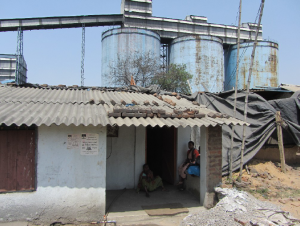
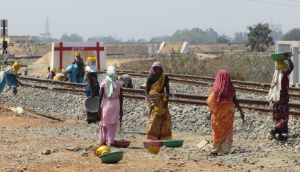
Aluminium’s Jharsuguda complex women living in shanty town homes along the periphery of the plant, told us of the plight of being the wife of a Vedanta worker. Rukmini Kharsel and Ratnakar Kharsel told us how the men in the family go the factory for a wage of 120-140 rupees a month and often get sick when they come back home. The women fear this is the result of industrial chemicals and processes.When we visited Jharsuguda in 2012 we also saw women working on railway and house construction in hot and backbreaking conditions.
At the Bodai-Daldali and Mainpat mines in Chattisgarh women from the Baiga tribe work in deplorable conditions for low wages – reported as 60 rupees for 1 tonne of ore mined by a man, and less for women, in 2005. Many of them were forcibly and illegally displaced to make way for the mines and live in conditions of extreme poverty around the quarry. One Gond man living in the area and driving bauxite filled trucks described the effect on his community’s quality of life;
“Earlier if there was suffering in one family, the entire village used to gather. But now… they first go for breaking the stone (bauxite) and earning there even if somebody dies. I eat 1 kg of stones every month… the stone dust comes through nose, ears and eyes filled by dust, which is not digestable… There is scarcity of water and of so many things so even if people may call it development, their land has gone” and what “they are eating is not nutritious.” (from Mining away indigenous home on Earth, Ville-Veikko Hirvelä).
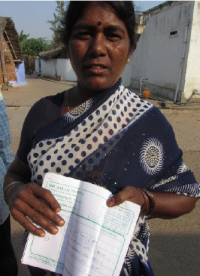
Sickness caused by pollution and waste dumping are common for those who live around Vedanta’s plants, and children and pregnant women are of course particularly susceptible to the effects of these toxins. In March this year a major gas leak at Vedanta subsidiary Sterlite’s copper smelter in Tuticorin, Tamil Nadu choked thousands of local residents and allegedly caused one woman to have a miscarriage. At Vedanta’s MALCO power plant in Mettur, Tamil Nadu, local women (also the recipient of loans under Vedanta’s Self Help Groups) suffer continual breathing problems from pollution which rains down from the plant’s cooling towers, as well as a major red mud dump just beside their homes. There have also been a number of pollution incidents which have left local people with allergies and lung problems.
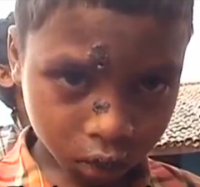
Micro-finance Self Help Groups are set up by Vedanta in the areas where women are resisting the destruction of their livelihoods by the company. On the one hand, this is an attempt to bind women into relationships of obligation through loans and suppress their protests. It is also a means of absolving the company of all responsibility for the survival of the poor families it has dispossessed and shifting the burden on to women.
Many of Vedanta’s highly promoted Corporate Social Responsibility exercises, such as building hospitals and health centres, have been revealed as shams. At the Lanjigarh refinery at the foot of the Niyamgiri hills in Odisha, a 2009 documentary film revealed that the hospital inside Vedanta’s housing colony for displaced people had no doctors at all. Vedanta’s major PR programme to run a film competition to promote their CSR activities, entitled Mining Happiness, was pulled following a campaign against it entitled ‘Faking Happiness’ which showed the true face of the the company and its multiple human rights abuses. The campaign highlighted the tokenism of most of Vedanta’s CSR efforts, which are a small drop in the ocean relative to the environmental destruction, displacement, poverty and ill health caused by the company.
These activities lead to the destruction of livelihoods and communities, deepening poverty, unemployment, insecurity and alcoholism – all of which differentially affect women and girls. These factors also heighten violence against women and girls and leave them vulnerable to trafficking and sexual exploitation.
It is not surprising that women have been at the forefront of concerted struggles against the company for many years. Vedanta has responded with violent repression. In April this year ten women and two two year old children who were with them were picked up by a Vedanta vehicle with police inside it, arrested on false charges, and kept in jail for one month and three days. These women were members of the Land Losers Association – a group who have protested their forced displacement for the refinery with no compensation. Doini Niha spoke to us about the incident:
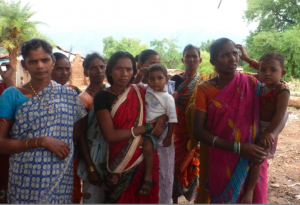
“They took two children also into jail. My son, Bulbul Nihal, two yrs and Aditya Nihal, son of Saraswati Nayak, also two yrs – were in jail with us. What crimes have these little children, who have just learnt to speak, committed? The police and company have no right to keep kids in jail like this!”
Jamuna Durga – another of the women, described their harassment by the police and the company:
“ We have no proper information about the court case that has been registered against us. We saw our lawyer being paid money in the police station. The police and lawyers have been bought by the company. There is no-one to listen to the cries of the poor. When the police had taken us in the Vedanta vehicle on 7th April, which was a Sunday, we were told that we would be released by the following Tuesday, the 9th. However, we stayed in jail for a whole month and three days. The police and company is trying to scare us, to intimidate us, so that they can break our will, our voice and our struggle.”
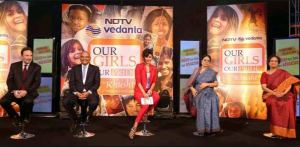
Despite overwhelming evidence to the contrary, Vedanta’s annual reports glow with stories of happy families and communities benefiting from their charitable efforts. These reports are very useful to fulfil the ethical standards of investors and shareholders and improve their public reputation. However, at the company’s Annual General Meeting this July one of Vedanta’s larger shareholders – Aviva – criticised the company once again for their lack of progress on corporate responsibility. It is more than a coincidence that just when Vedanta is taking a reputational nosedive over the total opposition of the Dongria Kond to it’s Niyamgiri project, and its poor sustainability and human rights record, it launches a major PR campaign asserting the contrary. The ‘Our Girls, Our Pride’ campaign is a cynical attempt to distract attention from Vedanta’s crimes at a time when it stands exposed across India and internationally. Vedanta’s interests are directly opposed to those of India, its people and particularly the girl children from poor communities it claims to be helping. We appeal to Priyanka Chopra and others involved in the campaign to cut their ties with this despicable corporate and pull out of the Our Girls Our Pride programme.
Open letter to Priyanka Chopra
Dear Priyanka Chopra,
We are deeply shocked and dismayed to hear that you have agreed to become a Brand Ambassador for a campaign ‘Our Girls, Our Pride’ launched by one of the most notorious mining companies in the world – Vedanta Resources. Are you aware that Vedanta’s activities are destroying the lives of thousands of girl children in Odisha, Chhattisgarh and other states of India where the company is active and also in many countries of Africa? Are you aware also that the struggle against Vedanta’s activities has been led by women and girls?
These activities have caused massive displacement which has led to the destruction of livelihoods and communities, deepening poverty, unemployment, insecurity and alcoholism – all factors which differentially affect women and girls. These factors also heighten violence against women and girls and leave them vulnerable to trafficking and sexual exploitation.
Vedanta’s activities have also led to extensive poisoning of natural resources and pollution causing death and ill-health on a vast scale. As is well-known, pollutants are absorbed by infants and into the foetuses of pregnant women in high concentrations leading to serious ill-health and birth defects. In March this year a major gas leak at Vedanta subsidiary Sterlite’s copper smelter in Tuticorin, Tamil Nadu choked thousands of local residents and allegedly caused one woman to have a miscarriage. At Vedanta’s MALCO power plant in Mettur, Tamil Nadu, local women suffer continual breathing problems from pollution which rains down from the plant’s cooling towers, as well as a major red mud dump just beside their homes. There have also been a number of pollution incidents which have left local people with allergies and lung problems.
It is not surprising that women have been at the forefront of concerted struggles against the company for many years. Vedanta has responded with violent repression. In April this year ten women and two two-year-old children who were with them were picked up by a Vedanta vehicle with police inside it, arrested on false charges, and kept in jail for one month and three days. These women were members of the Land Losers Association – a group who have protested their forced displacement for the refinery with no compensation.
Vedanta has harmed communities not only as a result of displacement and pollution and environmental destruction but also as an employer. In Vedanta’s mines both men and women work in deplorable conditions for extremely low wages. Countless children’s life chances have been affected by the deaths and serious injuries sustained by their parents who are workers in Vedanta’s mines, factories and other processing operations.
In September 2009, for example, up to 100 workers were killed at Vedanta subsidiary BALCO’s Korba factory in Chhattisgarh when a chimney they were building with a cheap Chinese contractor collapsed on them. Vedanta claim only 42 were killed, but more than 60 remain missing.
The campaign on girl children is in fact just Vedanta’s latest attempt to save its tattered reputation after twelve villages in Odisha voted them out of Niyamgiri for good. Its earlier Corporate Social Responsibility (CSR) exercises, such as building hospitals and health centres, have been revealed as shams. At the Lanjigarh refinery at the foot of the Niyamgiri hills in Odisha, a 2009 documentary film revealed that the hospital inside Vedanta’s housing colony for displaced people had no doctors at all. Vedanta’s 2010 film competition to promote its CSR activities, entitled ‘Mining Happiness’, had to be pulled following a campaign against it entitled ‘Faking Happiness’ which showed the true face of the company and its multiple human rights abuses.
In another of Vedanta’s attempts at CSR whose grandiose proclaimed aim is to make India a ‘malnourished child free nation’the company has taken over 14,000 Anganwadi (child day care) centres – as part of a mass privatisation programme. This has in fact led to centres being shut down and jobs lost. Anganwadi teachers in Karnataka held a protest in July which demanded an end to Vedanta’s privatisation by December or a state wide strike would be held.
Vedanta is also involved in ‘transforming women into Rural Entrepreneurs’ through micro-finance self-help groups. This is taking place in the areas where women are resisting the destruction of their livelihoods by the company. On the one hand, this is an attempt to bind women into relationships of obligation through loans and suppress their protests. It is also a means of absolving the company of all responsibility for the survival of the poor families it has dispossessed and shifting the burden on to women.
The ‘Our Girls, Our Pride’ campaign is a cynical attempt to distract attention from Vedanta’s crimes at a time when it stands exposed across India and internationally. Vedanta’s interests are directly opposed to those of India, its people and particularly the girl children from poor communities it claims to be helping.
We hope that you will withdraw from this discredited and damaging campaign and not lend your name to its ill-effects.
Yours sincerely,
Kavita Krishnan (All India Progressive Women’s Association)
Vani Subramanium (Saheli Women’s Resource Centre, New Delhi)
Arati Chokshi (People’s Union for Civil Liberties, Bangalore)
Poarkodi Natarajan and Gandhimati (All India Progressive Women’s Association, Karnataka)
Vidya Dinker (Karavali Karnataka Janabhivriddhi Vedike, Mangalore, Forum Against Atrocities on Women, Citizens Forum for Mangalore Development, Mangalore)
Sushma Varma (Samanatha Mahila Vedike, Bangalore and Mahila Munnade, Mandya)
Soma Marik (Visiting Professor, School of Women’s Studies, Jadavpur University, Jadavpur, West Bengal)
Manasi Pingle (Filmmaker, Bangalore)
Uma V Chandru (Activist, Bangalore)
Tultul Biswas (Activist, Bhopal)
Niyamgiri Suraksha Samiti, Odisha, India.
Baljit Banga (Newham Asian Women’s Project, London, UK)
Pragna Patel (Southall Black Sisters, Southall Middlesex, UK)
Sarbjit Johal (Freedom Without Fear Platform, UK)
Zlakha Ahmad (Apna Haq , Rotherham, UK)
Ila Patel (Asha Projects, London, UK)
Firoza Mohmed (Humraaz Refuge, Blackburn, UK)
Nityanand Jayaraman, (writer, social activist, Chennai.)
Nina Lopez (Global Women’s Strike, London, UK)
Niki Adams (Legal Action for Women, London, UK)
Andaiye (Red Thread, Guyana),
Claire Glasman (WinVisible – women with visible and invisible disabilities, London, UK)
Sara Callaway (Women of Colour in the Global Women’s Strike, London, UK)
Margaret Prescod (Women of Color in the Global Women’s Strike, USA)
Pat Gowens (Welfare Warriors, Milwaukee, USA)
Monica Peabody, (Parents Organizing for Welfare and Economic Rights (POWER), Olympia WA, USA)
Lori Nairne, (Legal Action for Women, USA)
Phoebe Jones, (Global Women’s Strike, USA)
Carolyn Hill, (DHS Give Us Back Our Children, Philadelphia PA, USA)
Pat Albright, (Every Mother is a Working Mother Network, USA)
Samarendra Das (Foil Vedanta, London, UK)